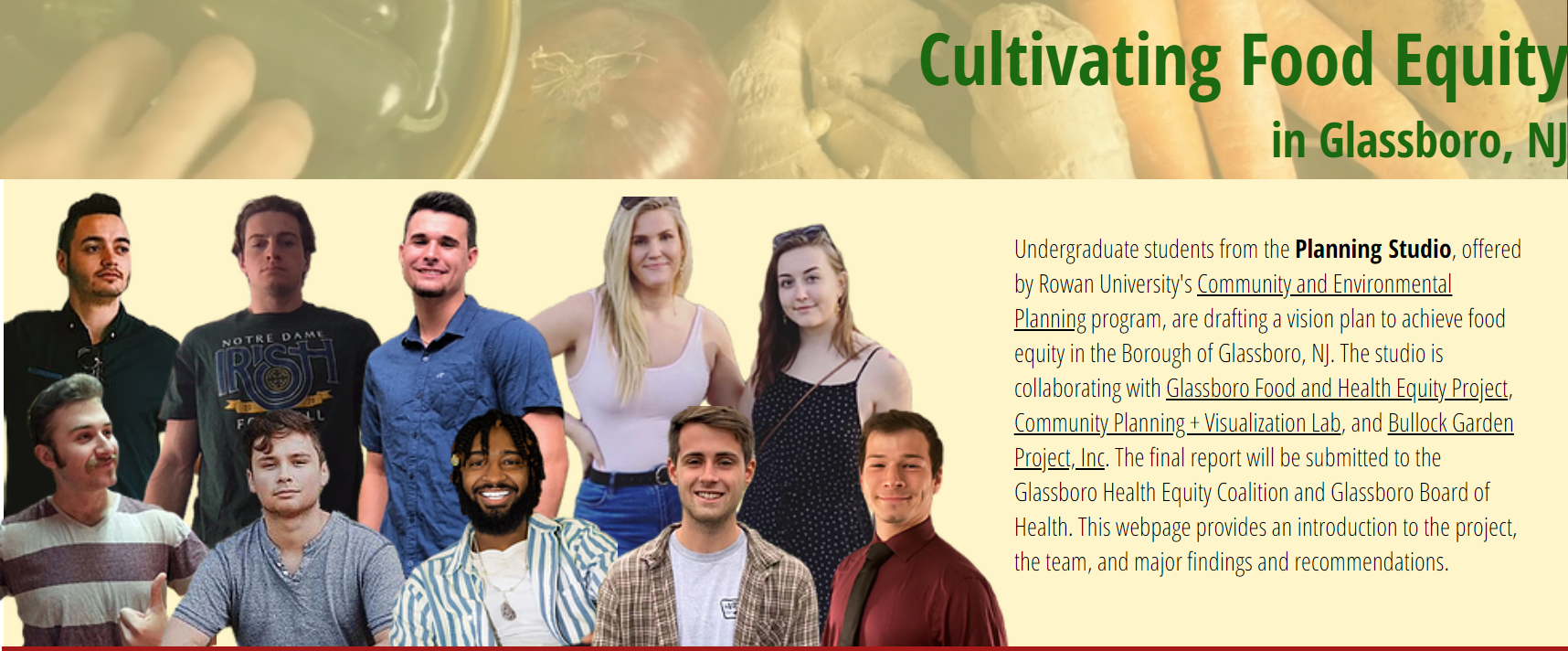Cultivating Food Equity
Cultivating Food Equity
Rowan Planning Studio on Cultivating Food Equity in Glassboro
By Hunter Swanson (BS Planning, class of 2021)
On the evening of May 3rd, 2021, ten students from Rowan University Planning Studio, offered by the Community and Environmental Planning program, presented their final vision plan, Cultivating Food Equity in Glassboro, NJ, which seeks to tackle food inequity issues within the Borough of Glassboro. The presentation was held online over a zoom meeting for an audience of about 30 individuals, consisting of Glassboro residents, municipal and business representatives, and other stakeholders, as well as Rowan faculty and students.
Certain parts of Glassboro currently suffer food inequities and challenges. This presentation capped a semester-long development process, which included extensive analysis, research, and community outreach on the existing food environment and the needs of Glassboro residents. By doing so, the Planning Studio was able to produce recommendations for the Borough that would aim to address the community’s food access needs. The Studio collaborated with the Glassboro Food and Health Equity Project, Community Planning + Visualization Lab, and Bullock Garden Project, Inc.
Starting in January 2021, the team, under the supervision of Dr. Mahbubur Meenar, began researching the concepts involved with food equity and how they applied to Glassboro’s current situation. The members gathered existing data and created new data on Glassboro to understand the context, characteristics of the local community, existing socio-economic conditions, the built environment, and the food environment. Next, the students conducted extensive community outreach through two online surveys (48 and 24 responses each), two focus groups (20 people combined), and stakeholder interviews (21 total). By doing so, the team was able to capture community voices and better understand the local perceptions on food equity. They also identified barriers not found in prior research.
This background research allowed for the class to create recommendations based on the available data and responses in the community outreach phase. These recommendations were organized in three main categories: projects, programs and policies.
The projects were suggested to increase the healthy food supply by empowering Glassboro residents to cultivate their own food while also providing them with additional food sources. Highlighted recommended projects from this category included a mid-size grocery store with a rooftop farm and the development of community gardens.
The recommended programs focused on reinforcing local food systems by engaging community institutions, increasing cross-sector collaborations, and empowering residents through various resources. Such programs included the creation of healthy food pantries to ensure a nutritional source of food for at-risk communities, and a gleaning and foresting program which would ensure alternative sources of food.
Lastly, the recommended policies aimed to provide financial and legislative assistance to establish healthy food programs that increase access to healthy and affordable food. The primary propositions included allowing for chicken coops in residents’ yards, and front yard gardening throughout Glassboro. The current zoning ordinance has a lot of restrictions.
The Planning Studio’s presentation was a success and it received accolades from the audience on May 3rd. Despite the limitations of the virtual presentation, the viewers were greatly engaged and asked numerous questions to the presenters. As this project is a vision plan, the Studio sought to provide recommendations for the Borough to address food inequity. Therefore, these were true outputs of the Studio’s plan, acting as possible guides for future projects, programs, and policies that could be carried out by Glassboro. Future planning classes may have the opportunity to study feasibility of the projects, programs, and policies recommended in this vision plan.
To learn more, please visit https://www.planviz.org/planningstudio2021. A recorded version of the final presentation is available on YouTube. If you have an idea about a potential future project for the Planning Studio, please email Dr. Meenar at meenar@rowan.edu.
